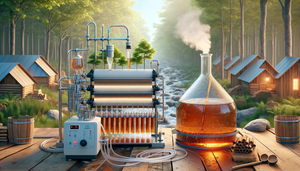Water Conservation in Maple Syrup Production
Jul 11, 2024
Maple syrup is a cherished delicacy, evoking images of cozy breakfasts and Vermont's rich, natural landscapes. Beyond its delightful sweetness, maple syrup production is a testament to sustainable practices, particularly in water conservation during the reverse osmosis and filtering processes. Let's explore how producers carefully manage water resources, ensuring that each bottle of maple syrup is crafted with quality and environmental responsibility.
The Importance of Water in Maple Syrup Production
Water plays a crucial role in the production of maple syrup. The process begins with collecting sap from maple trees, which is predominantly water. To transform this sap into syrup, producers must reduce its water content, which traditionally required extensive boiling. Modern advancements, however, have introduced methods like reverse osmosis and advanced filtering techniques, significantly enhancing efficiency and sustainability.
Reverse Osmosis: A Modern Marvel
Reverse osmosis (RO) is a game-changer for maple syrup producers. This technology reduces the sap's water content by forcing it through a semipermeable membrane, separating water from the sugar and other components. This not only accelerates the syrup-making process but also conserves energy and water.
How Reverse Osmosis Works
- Collection: Sap is collected from maple trees.
- Filtration: The sap is pre-filtered to remove debris.
- Osmosis Process: The sap is pumped through an RO unit, where water molecules pass through a membrane, leaving concentrated sap behind.
- Concentration: The concentrated sap is then boiled down to create syrup.
Water Savings
By using RO, producers can remove up to 75% of the water from the sap before boiling, drastically reducing the fuel needed for evaporation. This conserves water and minimizes the carbon footprint of maple syrup production.
Filtering: Enhancing Purity and Reducing Waste
Advanced filtering techniques further improve the efficiency of syrup production. Once the sap has undergone reverse osmosis, it is filtered to remove any remaining impurities.
Types of Filters Used
- Pre-filters: Remove larger particles.
- Fine Filters: Capture smaller impurities.
- Activated Carbon Filters: Eliminate any off-flavors or odors.
Benefits of Advanced Filtering
- Purity: Ensures a clean, high-quality syrup.
- Efficiency: Reduces the need for additional boiling, saving water and energy.
- Sustainability: Minimizes waste by reclaiming and reusing filtered water wherever possible.
Sustainable Practices in the Sugarhouse
Maple syrup producers are deeply committed to sustainability. In addition to water conservation through RO and filtering, many sugarhouses adopt various eco-friendly practices.
Common Sustainable Practices
- Energy-efficient equipment: Utilizing energy-efficient evaporators and heat recapture systems.
- Wood-fired boilers: Using renewable wood sources for boiling sap.
- Sap storage: Using insulated tanks to maintain sap quality and reduce energy consumption.
Conclusion: The Sweetness of Sustainability
Maple syrup production is more than just a culinary tradition; it is a testament to sustainable practices and a deep respect for natural resources. Through innovations like reverse osmosis and advanced filtering, producers conserve water and energy, ensuring that this beloved treat can be enjoyed for generations to come. Each drop of syrup brings sweetness to our tables and carries the essence of responsible stewardship of the environment.
FAQs
Q: What is reverse osmosis in maple syrup production?
A: Reverse osmosis is a process that removes water from sap by forcing it through a semipermeable membrane. This concentrates the sap and reduces the need for extensive boiling.
Q: How does filtering help in water conservation?
A: Advanced filtering techniques ensure the purity of the syrup and reduce the need for additional boiling, saving water and energy.
Q: What are some sustainable practices in maple syrup production?
A: Producers use energy-efficient equipment, wood-fired boilers, and insulated sap storage to conserve resources and minimize environmental impact.
Q: Why is water conservation important in maple syrup production?
A: Conserving water reduces syrup production's environmental footprint and ensures this cherished tradition's sustainability.


